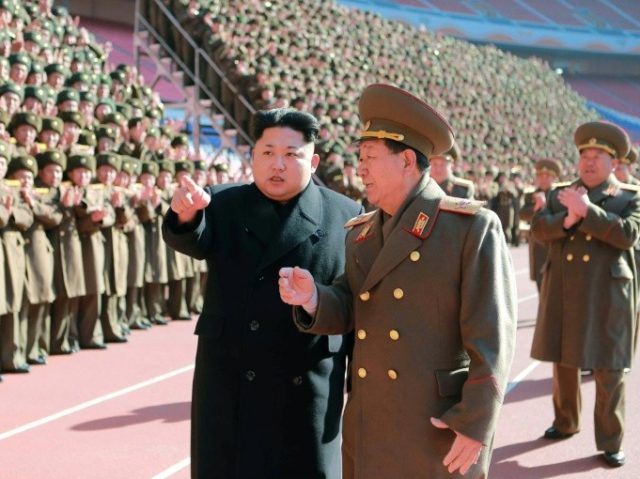South Korean intelligence has determined that two top North Korean military officials, both previously considered close to dictator Kim Jong-un, have been punished for “impure behavior” in what some analysts believe is a sign the Kim regime is weakening in the face of tough sanctions and political pressure from China.
CNN notes that South Korean intel is not certain what the “impure behavior” was, or how the two officials were punished, but analyst Andrei Lankov of Seoul’s Kookmin University said it might involve “re-education” or “re-indoctrination of North Korean ideology.”
As it happens, the government has also launched an audit of North Korea’s General Political Bureau, the agency in charge of ideological indoctrination and seeding the military with political officers. One of the officials accused of impure behavior, Hwang Pyong-so, is the director of the bureau; the other, Kim Won-hong, is his deputy.
CNN speculates their fall from grace might be a consequence of last week’s defection of a North Korean soldier, who survived a hail of bullets from his former comrades and is recuperating in South Korea. The defector’s hideous medical condition, including foot-long intestinal parasites, is a tremendous embarrassment to the North Korean government, and might even be taken as a sign of military weakness in a time when Pyongyang is desperate to present an image of strength and defiance.
Another theory is that Hwang and Kim were shuffled off to re-education to consolidate power around Kim Jong-un and send a message of unity to China. The official who gave the order to punish Hwang and took control of the General Political Department, Choe Ryong-hae, was involved in sensitive talks with China just last week.
Other analysts note that Kim Jong-un seems to purge his top officials after they have held important positions for about a year, to keep any of them from becoming too powerful. Kim Jong-un might also be seeking to reduce the power and prestige of the GFB a bit, fearing the agency itself has grown too powerful.
Reuters notes that Hwang Pyong-so was one of Kim Jong-un’s “most trusted advisers,” almost literally his right-hand man, having sat beside him as the only man in military uniform at the table when Kim ordered North Korea’s sixth and largest nuclear test. His 2014 visit to South Korea for the Asian Games made him the highest-ranking North Korean official to visit the South. He was believed to have a spotless career record until now and was seen as quite adept at staying on the good side of his notoriously (and often murderously) fickle dictator.
The Korea Herald dubs Hwang “the second most powerful man in North Korea” since Kim’s assumption of the dictatorship after his father’s death in 2012.
“Information on North Korea is often difficult to obtain, and with few hard details and no official confirmation from Pyongyang, analysts said it was too soon to draw any firm conclusions from the unspecified punishments,” Reuters notes. “But the moves, which appear to involve two of Kim’s top four advisers, are being closely watched for indications of fractures within his secretive inner circle, and come as North Korea faces increasing international pressure over its nuclear weapons program.”
Reuters cites speculation from South Korean lawmaker Kim Byung-kee, who sits on his country’s intelligence committee, that Hwang was temporarily demoted to make a major purge unnecessary since North Korea cannot afford a bloodbath and chaos in the top ranks in these tense times.
It might also be something as prosaic as a power struggle within Kim’s inner circle, as Choe Ryong-hae is something of a rival to Hwang Pyong-so, and has been making a comeback in Pyongyang after being subjected to “re-education” himself at one point.
The Korea Herald seems inclined to credit all of these theories as being at least partially true: Hwang is being punished for an unsatisfactory performance review of his GPB agency, he is losing a power struggle with Choe, paranoid Kim wanted to take him down a notch because he has been the number-two man for too long, and Kim wants to tighten political control over his military structure.
The New York Times offers an intriguing and potentially either encouraging or alarming take: Kim Jong-un is “using his tactic of instilling fear in the elites in order to strengthen his control as the country braced for the pain that is likely to result from recently imposed United Nations sanctions.”
Noting that Hwang’s name recently slipped behind those of his rival Choe and Premier Pak Pong-ju, who manages economic matters, South Korean analyst Cheong Seong-chang told the Times that North Korea seems determined to “focus on the economy and how to overcome international sanctions, now that it has succeeded in testing a hydrogen bomb.”

COMMENTS
Please let us know if you're having issues with commenting.